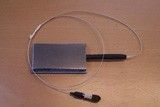
-
StatusCompleted
-
Status date2012-07-31
-
Activity Code5C.041
The goal of this activity was to design, manufacture and demonstrate two hybrid devices encompassing: an ADC with an electro-optic transmitter and a DAC with an optoelectronic receiver both adapted to support Gbps fibre optic interconnects linking to a high throughput Digital Signal Processor on board telecommunications satellites.
The key issue of this project is to develop two hybrid devices encompassing:
- State-of-the-art AD-Converter with an electro-optic transmitter,
- State-of-the-art DA-Converter with an optoelectronic receiver.
The main challenges were in the realisation of opto-electronic sub-assembles and combining them with a SERDES function realized using an FPGA circuit with output ports operating at 6.25 Gbps. The link contains 4 parallel channels and is redundant.
With these two hybrid devices, namely ADC-Hybrid and DAC-Hybrid, analogue and digital functions and signal processing can be decentralised from each other to most optimised locations inside a satellite. This will also minimise the need for analogue data transfer.
In addition to the high data rate, benefits of fibre optic links are their reduced weight, galvanic isolation, spark immunity and tolerance against electromagnetic interference.
The project utilised LTCC-technology for hybrid modules and created a concepts for opto-electronic VCSEL-transmitter and photodiode receiver sub-assemblies combined with optical fibre cables.
Combined with the results of another related ESA Study on “Optical Interboard Interconnects for High Throughput On Board Processors” (“OI2”), primed by Thales Alenia, a good confidence on the feasibility of the concept was gained. Main challenges are in controlling the high frequencies and making efficient and reliable connections for the optoelectronic components (VCSEL & photodiode) and the optical fibre.
Recommended continuation activities are making use of all components as dies in flip-chip format and further improving the production process of opto-electronic sub-assemblies (Tx/Rx).
This project focused on integrating state-of-the-art AD-converter (2 Gsps) and optical transmitters into a single Hybrid Device and similarly to integrate optical receivers and state-of-the-art DA-converter (2 Gsps) into another hybrid.
The target is to support up to 25 Gbps transmission capability by using fibre optic links.
Specific tasks to be performed in this project are the following:
- Review of requirements and architectural Trade-off,
- Design, manufacture and testing of Hybrid ADC device,
- Design, manufacture and testing of Hybrid DAC device.
The project was completed at the end of June, 2012.





